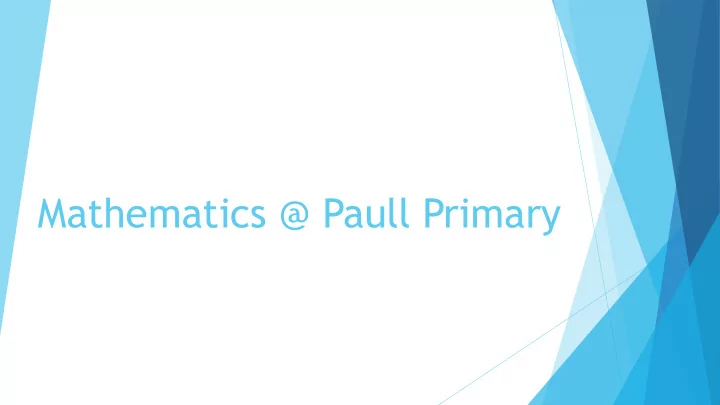

Mathematics @ Paull Primary
Mathematics @ Paull Chris Quigley milestones are used to meet the national curriculum. Split into three milestones Y1/2 Milestone 1 Y3/4 Milestone 2 Y5/6 Milestone 3 EYFS curriculum for nursery (Foundation Stage 1) & reception (Foundation Stage 2) Big maths all year groups.
CHRIS QUIGLEY
Big Maths Big maths focuses on the main mathematical principles. Clear progression from year to year. Build on prior learning and ensure children are secure in their knowledge. Common methods taught and language used throughout the school. Focuses on the number and four rules of mathematics. Develops the skills through regular practice. Shows the children’s progress through weekly testing. It is used as a small part of every maths lesson or taught sep. The principle is to enable to basic mathematical skills to be used in all areas of maths such as: Measures Problem solving Data handling Shape
Big Maths The Learn Its Challenge or Minute Maths: Covers all the addition and multiplication facts needed. The CLIC Challenge: Covers all the basic skills that a child needs to be properly numerate. Chris Quigley: Covers the rest of the Maths curriculum.
C ounting: Saying numbers • Reading numbers • Core number • Counting skills • • Actual counting Counting on • Counting multiples • Count different ways • Counting along •
Adding There is no new maths involved when we add 30 + 40 = 70 multiples of ten together. 3 tens and 4 tens = 7 tens So its nothing new that… 3 things and 4 things = 7 things 3 + 4 = 7
Step Addition learnits Multiplication learnits L earnits 15 X12 table 14 X11 table 13 The six fact challenge 12 X8 table 11 X4 table 10 X3 table 9 5+9 6+9 7+9 5+7 5+8 6+8 X2 table 8 4+5 5+6 6+7 7+8 8+9 X5 table 7 3+8 3+9 4+7 4+8 4+9 X10 table 6 6+6 7+7 8+8 9+9 Multiples of 2 5 4+2 5+2 6+2 7+2 9+2 4+3 5+3 6+3 4 2+8 3+7 4+6 Multiples of 5 3 1+2 2+3 Multiples of 10 2 3+3 4+4 5+5 1 1+1 2+2
I ts nothing new • Addition • Doubling/halving • Jigsaw numbers • X10/ ÷ • Smile multiplication • Coin multiplication • Fact families.
Coin Multiplication X 26 Children start by completing a 1 & 1 26 10 Coin Card 2 52 Then a 1, 2, 5, & 5 130 10 Coin Card 10 260 They then 20 520 progress onto 50 1300 the full Coin 100 2600 Card
C alculation Step 1 - I know when to add some Step 11 - I can add 2 or 3 to a Step 22 - I can add a 2d tens more number up to 20 number to a 2d number Step 2 - I know to find the total Step 12 - I can add a 1d number Step 23 - I can add any 2d tens Step 3 - I add the right amount to a number to 20 number to a 2d number Step 4 - I add the right amount Step 13 - I can add 1 to a 2d Step 24 - I can add a 2d number and can count how many number to a 2d number altogether Step 14 - I can add 10 to a 2d Step 25 - I can solve any 2d+2d Step 5 - I can add numbers of tens number Step 26 - I can solve 3d+2d objects to 10 Step 15 - I can add 10 to any 2d Step 27 - I can solve any 3d+2d Step 6 - I can read a number number Step 28 - I can solve 3d+3d sentence Step 16 - I can add a 1d number Step 29 - I can solve any 3d+3d Step 7 - I can arrange a number to a 2d tens number Step 30 - I can solve 3d+3d as sequence Step 17 - I can solve 2d+1d money Step 8 - I can solve a number Step 18 - I can add a 2d tens sentence number to another one Up to step 39- I can solve Step 9 - I can solve addition on a Step 19 - I can solve any 1d+1d in additions with several numbers. number line my head Step 10 - I can add 1 to a number Step 20 - I can solve any 2d+1d up to 20 Step 21 - I can add any 2d tens number to another one
SATS! EYFS – Teacher Assessment KS1 – Teacher Assessment – backed up with SATS tests and moderation. KS2 – SATS & Teacher Assessment Tests – Arithmetic & Problem Solving
How can I support my child? Help your child to practice their ‘Learn Its’ or ‘Minute Maths’ at home/h. Each week your child will be introduced to new facts. Ask your child to tell you about their Maths skills. Praise! Celebrate the successes.
Recommend
More recommend